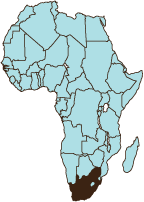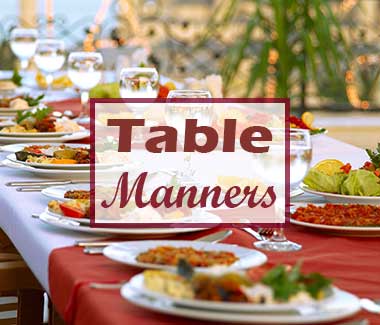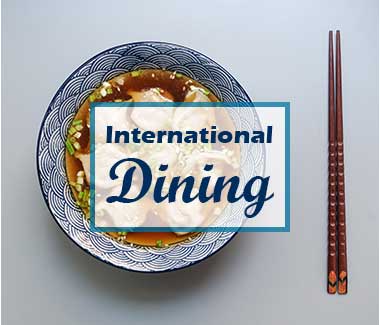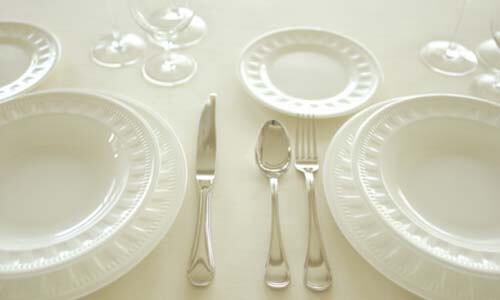South Africa Etiquette
Dining Etiquette
Mealtimes and Typical Foods
The typical diet is a combination of local ethnic group cuisine, Western foods, and Asian foods: much is available in South Africa. All groups enjoy barbecues, for example. Local food is rich in rice, yams and cassava (a root vegetable), plus breads, fresh vegetables. and fruits. Meats are enjoyed when available, and fish along the coast and rivers, Each ethnic group has its own specialties and preferences, and remember. Muslims will not eat pork or drink alcohol (although it is available). A typical dish is mealie meal (the South African version of the ubiquitous African porridge), served in any number of different ways.
A note on hosting and dining with observant Muslims: If you are serving a meal at home, be sure you do not use alcohol or pork in any of the dishes, and if you do, so labeling the dish and serving it separately will still make your Muslim guest uncomfortable: simply don't do it. You, as a guest in the more rural regions, may be rewarded with the opportunity to either dine first, or be offered the more favored food, such as the meat: please consider that this may mean that others in the family do Dot eat this. Also, if you are dining with or hosting Indians, there is a very good chance they are Hindu, and therefore, will most likely be vegetarian. If you are offered something you cannot eat or drink, acknowledge the honor and suggest that while you will always hold the honor in your heart, you in turn will bestow it on someone who can also appreciate it in his or her belly: then pass the honored dish on to a South African colleague. Alternately, yon may say thank you but that you have just eaten or drunk.
Breakfast is served from about 6 to 9 A.M., lunch from 12 to 2 P.M., and dinner from 8 to 10 P.M. the main meal of the day for most all groups is dinner. Urban South Africans will dine the Western way: rural South Africans will often dine in the more conservative African way, with a wooden spoon. a communal bowl. or no utensils (using the right hand). In such cases, traditionally children, women, and men dine separately, and men are offered the best parts first, women next, and children typically last.
It is very important to remove your shoes before entering most South African homes (look to see if other sandals are lined up at the entrance as your cue), and when seated to always make sure that your toes and feet are not pointing to the food or to others at the meal. In such settings, typically, conversation while eating is minimal, and most South Africans avoid eye contact when dining.
Regional Differences
Remember, Islam prohibits the use of pork, and most meats of any kind for Muslims need to be prepared halal (meat slaughtered according to Islamic prescriptions). Do not eat in front of your Muslim colleagues. or invite them to join you for a meal, during the day during Ramadan, as Muslims typically fast (and refrain from drinking and smoking) during the day, and feast with family and friends at night. Ramadan lasts for a lunar month: this is simply not a good time to do business or go out entertaining in the Muslim world.
Drinks and Toasting Etiquette
Tea, coffee, beer, water, and soft drinks are all available in most places. Some of the world's best wines are now coming from South Africa. When you come to a South African home, even for just a brief visit, you will most likely be offered tea, sometimes served English style-with milk and sugar-if available. Many South Africans really do take the time to have afternoon tea. When offered, always accept the cup of tea and/or coffee, even if you only put it to your lips or just take a few sips. Your cup will always be refilled if it is less than half full. Typically, beer and other alcoholic drinks may also be served: fruit juices and lemonades, along with tea, may accompany meals.
If you are the honored guest, you are not expected to make a statement or toast, but if you offer a small compliment, it will be appreciated (and then dismissed as unnecessary): you can do this at the end of the meal, just before everyone departs. An appropriate comment would be to wish for the health of the host and all those present: always be humble.
Avoid drinking tap water anywhere in the region (this means you should brush your teeth with bottled water and not take ice in any of your drinks: drink only bottled water, or brewed tea or coffee or soft drinks. and avoid getting water from the morning shower into your mouth: never eat fresh fruits or vegetables that cannot be peeled first. and ideally cooked later before eating). This is a serious matter: there are some very nasty-and sometimes deadly-bugs going around in developing countries. In addition, avoid all dairy products except in the finest hotels. as the required refrigeration may be questionable. Do not swim in freshwater lakes. ponds, or rivers due to the possibility of serious parasitic infection.
Table Manners
Modern urban South Africa has been significantly Westernized, as many of the Western modes of dining are understood and accepted (many South Africans, for example, dine with spoon and knife, held. as they are in Europe, in both hands, and in the same hands throughout the meal). However, understanding the traditional South African modes of dining behavior will be quite helpful as they are apparent and respected in most places. They vary group to group, but the following basic suggestions should be considered: Before meals, you must wash your hands, and wash them again when the meal is over. Traditionally, one eats with one's right hand from their plate. Never use your left hand unless you are clearly eating something that requires two hands; occasionally you may be offered a spoon or fork, which also must be held in the right hand, unless you also have a knife, in which case the knife is held in the right and the spoon or fork in the left. Keep your left hand off any bowls or serving items. If there is one communal bowl offered, eat only from that part of the communal plates or bowls that is directly in front of you. You may be seated at a table, on the floor, or on low stools. Do not smoke in the same area where the food is being served and wait to smoke until after the meal is finished (women typically do not smoke). Typically, people stay around for a bit after the meal for some conversation.
Seating Etiquette
The most honored position is next to the host. Most social entertaining is done in people's homes (although in the cities there is business dining in restaurants). The home, the market, or a local cafe is where local people typically meet, socialize, and get things done, including business (although business is not easily done in the market), outside of the major urban centers. Your spouse might be invited with you to a meal at home, especially if the spouse of the host will be there, which will probably be the case. The invitation will then typically be phrased, "My spouse invites your spouse." and women and men may (especially in Muslim areas) eat separately. By the way, invitations, business or social, will most always be verbal, not written.
Home / Restaurant / Work Etiquette
The honored guest is served first, then the oldest male, then the rest of the men, then children, and finally women. Do not begin to eat or drink anything until the oldest man at the table has been served and has begun. At the end of the meal, it is appropriate to thank the host or hostess for a wonderful meal.
In informal restaurants, you may be required to share a table. If so, do not force conversation: act as if you are seated at a private table. Women should be sensitive to the fact that they may be seated only with other women. Wait staff may be summoned by raising your hand or by making eye contact; waving or calling their names is very impolite. Since business and socializing in this part of the world are usually one and the same, business is often discussed over meals, once individuals know each other well enough to talk terms. Take your cue from your South African associates: if they bring up business, then it's okay to discuss it, but wait to take your lead from their conversation.
Once inside the home do not wander around. If you move from one area to another in a South African home or restaurant, be sure to always allow more senior members of your party to enter the room ahead of you.
Host / Guest Etiquette
Paying the Bill
Usually the one who does the inviting pays the bill. If invited to a home or if you are hosted in any way, thanks and compliments may be denied; nevertheless, it is important to state humble thanks, and to accept thanks graciously.
Tipping Etiquette
Tipping practices are similar to those in the West, although when out in the bush and rural areas, favors are expected from individuals to individuals who are providing a service or favor. Typically, it is a way of taking care of people; when abused, it is a form of graft that in some countries in the region, South Africa included, can be a rampant form of corruption. It is traditional to always give a little something to someone who has helped you out. The offer may be refused at first in some cases, but if you insist, it will be graciously accepted and appreciated. Tips in restaurants run about 10 percent, and are typically not included in the bill (but double-check to be sure): a tip is not necessary if you have negotiated the fare for the taxi ahead of time and already figured in the tip. For everything else, a few coins are all that is needed, but you should always have a lot of spare change handy to see you through the day. The South African currency is the rand.
Arriving / Helping Etiquette
If invited to dinner at a private home do offer to help with the chores and to help out in any way you can. Do not leave the meal area unless invited to do so. When in the home, be careful not to admire something too effusively: South Africans may feel obligated to give it to you and doing so might represent a great sacrifice. Your compliments will most likely be dismissed, although they will be appreciated.




